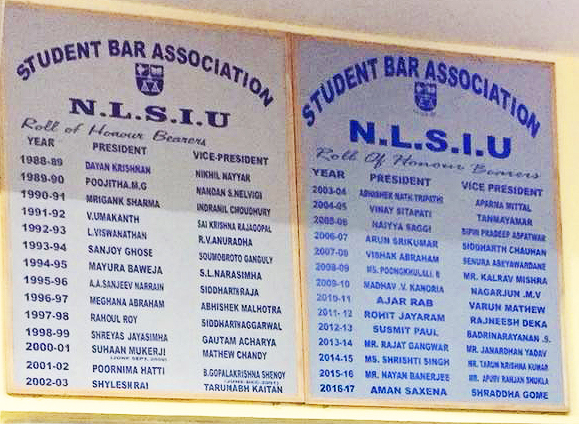This piece was written by Aman Saxena (Batch of 2018, SBA President NLSIU 2016-17).
Over the last year and a half, NLS has experienced waves of feminist movements. While a large part of it can be attributed to the Alliance of Oversensitive Women (AoW) for concerted efforts towards ensuring that sexism on campus becomes a central issue, a big push has also come from other different corners, be it the 4th year RCC class amending its RCC rules to out sexual harassment convicts to potential employers or the 3rd year girls standing up against the internalized culture of silence amongst the boys of the batch. I personally believe that the time is ripe for another gender norm at NLS to break which is, women not running for the office of the Student Bar Association.
In the last two decades, SBA has had only 3 women Presidents and two Vice-Presidents. While I do not have the data for all the candidates who contested in this period, in the span of 2013-17, there have only been 2 women candidates, and both of them assumed office. (Shrishti, 2014, President and Shraddha, 2016, Vice-President) It is not my claim that there should always be a woman office bearer and definitely not that one gender in office is better than the other. Instead, this is an exhortation to those women on the edge or even those thousands of metres behind the ‘laxman rekha’ as to why they should take the plunge this election season. I’ll attempt to do that by reflecting on the decisions I made during my term to highlight how the functioning of the office can be impacted by gender.
Decision making is gendered
AoW, upon its formation called out sexist comments made on campus via posters on the 19 (1) (a) notice board. It sparked a heated conversation as those who the statements could be attributed to posed a spirited defense that the statements (not all of course) were in jest and calling out was devoid of context. Around the same time, many classmates on my Himalaya group, argued that all alumni on the SBA noticeboard online forum should be immediately removed. Even though I initially resisted and was not comfortable because I believed that the timing of such a request wasn’t appropriate given that the alumni had shown their support for the feminist movement, I ultimately gave in to the request. I felt that it was a legitimate request as my batchmates were only asking me to fulfill my duty of ensuring that the SBA Notice board has no alumni to give the current students a safe space to discuss college issues. In fact that had been the purpose of having a separate group, much before any of this began. While the intervention in this particular case was termed welcome by a certain section of the student body, there was another section which believed and continues to believe that this intervention was uncalled for.
They felt that this intervention points towards the rooted sub-conscious systemic bias that occurs in decision-making. This is especially because it was made after a male-only discussion, asked for by males, in a conversation about male power at a very specific juncture. It also shows the issue with hearing some plaints over others. Even if the decision to remove Alumni would have been arrived at notwithstanding any bias, the process followed to arrive at this decision unintentionally excluded major stakeholders, including my Vice-President Shraddha, from the decision making process. It certainly did influence my decision-making though I may agree (to this date) with the rationale behind it. Shraddha, to this date disagrees.
Going a bit further, this decision was a product of my association with the guys of the batch as I share the hostel and a very active social media group with them. The level of familiarity and comfort is immense, so much so that I turned to them for counsel as well as help on most issues that crop up. This is natural and inevitable. For instance, in the last trimester, once the faculty recruitment notification got out in the last trimester, I needed a hefty assessment report of existing faculty to facilitate an informed decision-making. I do not trust “call for applications” since then the work only gets completed by deadline + many more months. This, I felt, was extremely urgent and had to be finished in a month. I had to handpick the committee as a result. While they did submit the report bang on time, out of 9 of them, only 2 were girls. Thus this process restricted involvement of women in an important exercise.
Prioritisation of women’s issues
At any given point, SBA is liasoning with the administration for multiple issues. Some are huge and extend all year long while others keep coming up as and when. They are taken up depending upon the bargaining capital, urgency of the situation and relative importance as compared to other issues. What is to be prioritized and deemed for urgent action is indeed decided at the discretion of those in office. Ideally your leader should be empathetic, but there is a difference between empathizing and prioritizing. For instance, securing equal access to the football field for women was on my manifesto. However, in my head, electives and recruitment were the top priority. I was heavily invested in those two and despite timely reminders for the field, I genuinely believed that ‘it can wait’ as I did not want us to look unreasonable before the administration with so many demands at one go.
I finally drafted and sent the petition only in the vacation before the third trimester. It took only one meeting and one mail for things to change. In retrospect, it could have been done earlier at any point of time, along with the other issues and not necessarily after. But because it was pushed down the priority list, it meant that half the student body had to wait for 8 extra months for equal access of a common space. Moreover, it was never even taken up as an issue by the office bearers before me. They tell you to ask the woman question, sometimes you don’t know what that question itself is unless you experience it on your own.
Normalisation of the Idea
Hollywood had its moment recently with the release of Black Panther. It’s an Afro-futuristic movie and it portrays a black kingdom and a black superhero in an everyday setting. It creates a positive message that such characters can be easy to relate to. When I joined law school, I heard Rajat Gangwar giving his speech to us on the orientation day. He eased us into the university and was the go to person for any problems. I remember many boys were awestruck, harbored SBA ambitions and some were touted as the next president from our batch. None of the girls were ever mentioned. I believe that seeing a woman in office or at least running for it would lead to normalization of the idea amongst the girls that women can and should run for this post and also provide a role model for them to aspire towards.
Fixing the scarcity problem
In a panel discussion held by AoW on the experiences of women in the workplace, Richa Naujoks (Partner at Nixon Peabody) said “you make a female person a Partner [in a law firm] because of her performance, but a male person a Partner because of expectations.” In the last five years, 3 elections have been uncontested with both male candidates who stood getting a position each. While there was mostly someone in opposition, they ended up backing out before the election day. NLS is a small ecosystem with about 500 voters. Males from 4th and 5th year LLB batches usually contest the election. It deprives the student body of a wider option to choose from, and often, as pointed out, there isn’t a choice. The problem can partly be fixed if the other half participated in the democratic process by actively vying for the office, giving the guys a run for their money.
The office of SBA in a university like NLS where most activities and initiatives are entirely student run is crucial. It would be wrong to say that any gender accounts for better leadership. At the end of the day, a candidate needs to be judged on his or her work ethic, track record, agendas, ideals, approachability and various other objective factors. However, at the same point, it is pertinent to recognize that there is indeed value to women running for political offices because of the advantages as pointed out as well as sub-conscious differences that may exist. In all the instances cited above, I would still have done what I did, there wasn’t anything wrong given my limitations and associations at the time. The point is that there is a possibility that it could have been done differently. With anyone yet to announce candidature, here’s hoping that the norm changes this year!


Comments